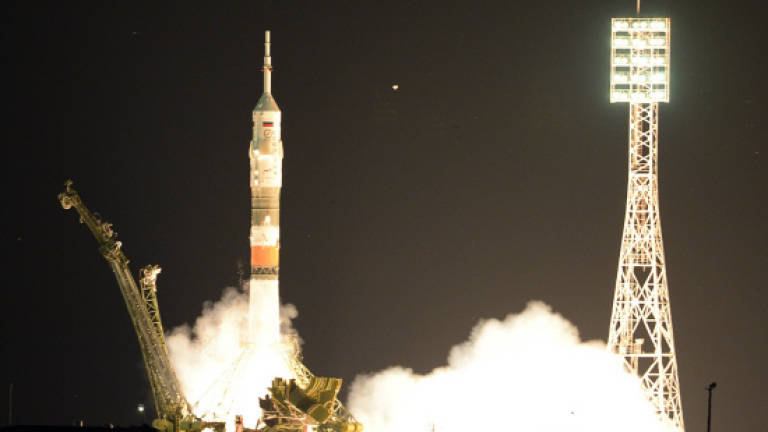Soyuz rocket with three astronauts launches towards ISS after delay

BAIKONUR, Kazakhstan: Three astronauts aboard a Soyuz spacecraft successfully launched towards the International Space Station on Thursday after a two-month delay caused by a Russian rocket failure.
The spacecraft blasted off on schedule from Russia's Baikonur cosmodrome in the barren Kazakh steppe at 2102 GMT, carrying cosmonaut Oleg Kononenko, US astronaut Kjell Lindgren and Kimiya Yui of Japan.
As the Soyuz TMA 17M rocket surged skywards from the launch pad, the fire from the boosters set the inky night sky aglow.
Russian officials breathed a sigh of relief, with the space agency Roscosmos saying that the third stage of the Soyuz rocket separated on time and the crew were "feeling well."
"Everything is okay, everything is according to plan," said veteran cosmonaut Fyodor Yurchikhin, providing live commentary of the liftoff on television.
All eyes were trained on the launch after Russia was in May forced to delay the astronauts' departure because a supply ship had crashed back to Earth following a rocket failure.
Russia put all space travel on hold after the failure of the unmanned Progress freighter taking cargo to the ISS in late April.
The doomed ship lost contact with Earth and burned up in the atmosphere. The failure, which Russia has blamed on a problem in a Soyuz rocket, also forced a group of astronauts to spend an extra month aboard the ISS.
A workhorse of space that dates back to the Cold War, the Soyuz is used for manned and unmanned flights.
'Ready to fly'
The new trio will reach the ISS in less than six hours if all goes to plan.
"Training ... check. Equipment ... check. Rocket ... check. Press conference ... check. We are ready to fly!!" 42-year-old Lindgren said on Twitter before the liftoff.
The team said they had faith in the Russian space programme, adding that the delay had given them extra time to prepare for their 163-day space mission.
"I think that all will go to plan," the team's commander, 51-year-old Kononenko told reporters on Tuesday.
But he also conceded that, in space, everything might not go as planned. "Unexpected things can happen," he told reporters in Star City outside Moscow this month.
"Machinery is machinery. It can let you down. But we trust the people, the engineers who created this machinery."
The Japan Aerospace Exploration Agency's Yui, who like NASA's Lindgren is making his maiden space voyage, said that the Soyuz was a reliable spaceship.
The spacemen said they were Star Wars fans and had chosen the R2-D2 robot, a key character in the film series, as a zero-gravity indicator for their mission.
Once the toy – which Lindgren said he had chosen with the help of his children – begins to float, the crew will know they have reached orbit.
For the official poster of the ISS Expedition 45, the astronauts posed wearing brown Jedi robes and clutching light sabres. At the ISS the trio will be joining Russia's Gennady Padalka and Mikhail Kornienko, as well as Scott Kelly of NASA.
They will conduct a number of scientific experiments including controlling robots remotely.
Kononenko said that at the request of young space enthusiasts, he would also study the behaviour of soap bubbles, among other experiments.
Cooperation in space
The space lab is one of the few areas of cooperation between Russia and the United States that has not been hit by the crisis in Ukraine.
Speaking ahead of the launch, Lindgren noted that earlier this month Russia and the United States commemorated the 40th anniversary of the Apollo-Soyuz mission which brought the two Cold War rivals closer together.
"I hope that for the next 40 years we will also cooperate with Russia closely," he said.
Ahead of the liftoff, the three men met with 81-year-old cosmonaut Alexei Leonov, the first man to walk in space and one of the Apollo-Soyuz commanders.
Sending the first man into space in 1961 and launching the first sputnik satellite four years earlier are among key accomplishments of the Russian space program and remain a major source of national pride in the country.
But over the past few years, Russia has suffered several major setbacks, notably losing expensive satellites and unmanned supply ships to the ISS. – AFP